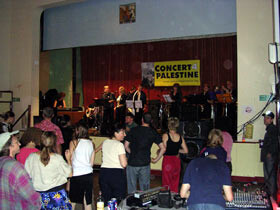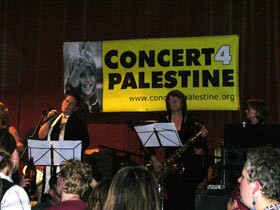7 October 2004

The scene at the Sheffield Concert for Palestine, which was webcast live (Photo: D. Campbell)
Sixteen years later, could music help to overcome an even greater challenge - to end the Israeli military occupation of Palestine and allow its people to live, at last, in peace and freedom? In Sheffield (the English industrial city that gave the world such bands as Pulp, Moloko, Human League, and Cabaret Voltaire), pro-Palestinian activists think so. This month, the Sheffield branch of the Palestine Solidarity Campaign hosted a “global” Concert for Palestine - webcast live over the internet - to call for an end to more than 37 years of Israeli military occupation.
Most of the performers were local bands, and proceeds from the concert will help fund a UK tour of a folk-dance group from Gaza’s Jabaliya refugee camp. But the Sheffield event had a more far-reaching goal. It was
staged to launch in the UK a global campaign for a world concert in defence of Palestinian human rights. That campaign was launched in May by Gazzella, an Italian NGO that helps rehabilitate children wounded by Israeli gunfire in the occupied territories. Since then, the campaign website - www.concert4palestine.org - has collected more than 22,000 votes in favour of its appeal to all the music world to organize the global concert. The concert idea has already won backing in the Scottish parliament, where 30 MPs have underwritten a motion of support. [1]
There are other signs that the time is right for a global concert for Palestine. UK parliamentarian Gerald Kaufman, a life-long supporter of Israel, now says it’s time Israel were treated like apartheid South Africa - with an international boycott. “Obtaining sanctions and a weapons ban today will not be easy,” wrote Kaufman, “That is all the more reason why a strong campaign needs to be mounted as soon as possible.” [2] More recently, artists including Roger Waters, Damien Rice, and Billy Bragg endorsed a campaign that calls for the removal of Israel’s illegal “security fence” from occupied Palestinian territory. “You would not expect the cool and the influential to come together over an issue as inflammatory as the Israel-Palestine conflict,” said Nick Dearden, campaign director of the UK charity War on Want. “But so violent is the record of Ariel Sharon that it seems Palestine may be emerging as an issue to rival the anti-apartheid movement in its appeal to a base-level sense of injustice.” [3]

Performers entertain at the Sheffield Concert for Palestine (Photo: D. Campbell)
With music, we want to “break the silence” over Israel/Palestine, to give voice to what most people already know in their hearts, whatever the media tell them: that what is happening in Palestine is a gross and intolerable injustice and that the longer it persists the more dangerous a world we will live in. We appeal to all those who play or enjoy music, of any kind, to organize a Concert for Palestine in their town or city, and tell us about their initiatives. Together we can send a clear message to Ariel Sharon: that colonialism ad oppression belong in the garbage can of history.
Dave Campbell is an activist with Sheffield PSC and UK contact for
Concert4Palestine.org. He has all of David Byrne’s records.
Notes
1. Support for Stop the Occupation Appeal (S2M-1346), lodged on 20 May 2004
2. “The case for sanctions against Israel”, Gerald Kaufman, The Guardian, 12 July 2004.
3. “Echoes of South Africa?”, Nick Dearden, War on Want
Related Links:
